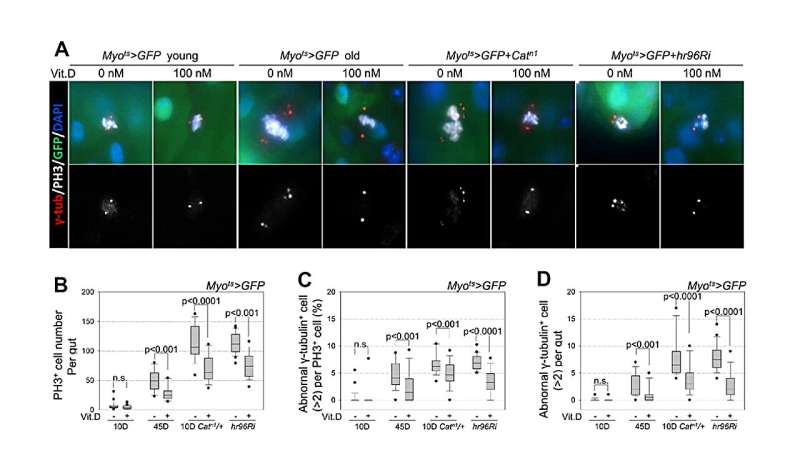This article has been reviewed according to Science X's editorial process and policies. Editors have highlighted the following attributes while ensuring the content's credibility:
fact-checked
proofread
The anti-aging effect of vitamin D and its receptor in Drosophila midgut

A new research paper titled "The anti-aging effect of vitamin D and vitamin D receptor in Drosophila midgut" has been published in Aging.
Adult stem cells are pivotal for maintaining tissue homeostasis, and their functional decline is linked to aging and its associated diseases, influenced by the niche cells' environment. Age- and cancer-related reduction of vitamin D and its receptor levels are well documented in human clinical studies.
However, the mechanisms through which the vitamin D/vitamin D receptor (VitD/VDR) pathway contributes to anti-aging and extends life expectancy are not well understood. In this new study, researchers Joung-Sun Park, Hyun-Jin Na and Yung-Jin Kim from Pusan National University and Korea Food Research Institute aimed to determine the protective role of the vitamin D/vitamin D receptor pathway in differentiated enterocytes (ECs) during intestinal stem cell (ISC) aging.
"This study aimed to determine the protective role of VitD/VDR in differentiated ECs during ISC aging using the adult Drosophila intestine model," write the researchers.
By utilizing a well-established Drosophila midgut model for stem cell aging biology, the researchers revealed that vitamin D receptor knockdown in ECs induced ISC proliferation, EC death, ISC aging, and enteroendocrine cell differentiation. Additionally, age- and oxidative stress-induced increases in ISC proliferation and centrosome amplification were reduced by vitamin D treatment.
In conclusion, this study provides direct evidence of the anti-aging role of the VitD/VDR pathway, involving protecting ECs during aging, and provides valuable insights for exploring the molecular mechanisms underlying enhanced healthy aging in Drosophila.
"Our findings suggest direct evidence of the anti-aging role of the vitamin D/vitamin D receptor pathway and provide insights into the molecular mechanisms underlying healthy aging in Drosophila," the researchers conclude.
More information: Joung-Sun Park et al, The anti-aging effect of vitamin D and vitamin D receptor in Drosophila midgut, Aging (2024). DOI: 10.18632/aging.205518





















